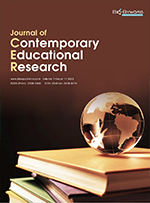Abstract
The Integrative Reading Enhancement and Assessment for Student’s Development (I-READ) Project aims to achieve this by providing students with diverse learning experiences that promote critical thinking, creativity, and communication skills. The project’s primary objective is to equip students with essential language skills that will enable them to comprehend, analyze, and communicate effectively. This study utilized a quasi-experimental research design. The researcher prepared reading material and a questionnaire to determine the performance of grade seven learners, who attended Cumba-Quezon Integrated School, in their language competence. The I-READ Project had a significant impact on the reading skills of the learners in the experimental group, as the learners had significant improvement in their reading capabilities. However, the research was conducted solely on grade seven learners, which limits the generalization of the findings to learners of other grades.
References
DeBruin-Parecki A, Van Kleeck A, Gear S. Developing Early Comprehension: Laying the Foundation for Reading Success. 2015, Paul H. Brookes Publishing Co., Baltimore.
Glenberg A, Goldberg AB, Zhu X, 2011, Improving Early Reading Comprehension Using Embodied CAI. Instructional Science, 39(1): 27–39. https://doi.org/10.1007/s11251-009-9096-7
Oberholzer B, 2005, The Relationship Between Reading Difficulties and Academic Performance Among a Group of Foundation Phase Learners Who Have Been: Identified as Experiencing Difficulty with Reading and Referred for Reading Remediation, thesis, University of Zululand Repository, University of Zululand.
Vaughn S, Klingner JK, Swanson EA, et al., 2011, Efficacy of Collaborative Strategic Reading with Middle School Students. American Educational Research Journal, 48(4): 938–964. https://doi.org/10.3102/000283121141030
Alfallaj FSS, 2017, Reading Competence of the Saudi EFL Learner: Empowering the Teachers through Linguistics. Advances in Language and Literacy Studies, 8(3): 12–17. http://dx.doi.org/10.7575/aiac.alls.v.8n.3p.12
Alenizi MAK, 2019, Understanding of Reading Among Teachers and Learners: A Descriptive Study of PreUniversity English Language Teaching/Learning in Saudi Arabia. Arab World English Journal, 10(2): 293–306.https://doi.org/10.2139/ssrn.3418530
Ismail NM, Tawalbeh TI, 2015, Effectiveness of a Metacognitive Reading Strategies Program for Improving Low Achieving EFL Readers. International Education Studies, 8(1): 71–87. http://dx.doi.org/10.5539/ies.v8n1p71
Perfetti CA, Landi N, Oakhill J, 2005, The Acquisition of Reading Comprehension Skill, in The Science of Reading: A Handbook, Blackwell, Oxford, 227–247. http://dx.doi.org/10.1002/9780470757642.ch13
Hulme C, Snowling MJ, 2011, Children’s Reading Comprehension Difficulties: Nature, Causes, and Treatment. Current Directions in Psychological Science, 20(3): 139–142. https://doi.org/10.1177/0963721411408673
De Beni R, Palladino P, 2000, Intrusion Errors in Working Memory Tasks: Are They Related to Reading Comprehension Ability? Learning and Individual Differences, 12(2): 131–143. https://doi.org/10.1016/S1041-6080(01)00033-4
Channa M, Nordin Z, Siming I, et al., Developing Reading Comprehension Through Metacognitive Strategies: A Review of Previous Studies. English Language Teaching, 8(8): 181–186. https://doi.org/10.5539/elt.v8n8p181
Woolley G, 2011, Reading Comprehension: Assisting Children with Learning Difficulties, Springer, Dordrecht, 15–34. https://doi.org/10.1007/978-94-007-1174-7
Fayyad U, Piatetsky-Shapiro G, Smyth P, 1996, From Data Mining to Knowledge Discovery in Databases. AI Magazine, 17(3): 37. https://doi.org/10.1609/aimag.v17i3.1230
Castles A, Rastle K, Nation K, 2018, Ending the Reading Wars: Reading Acquisition from Novice to Expert. Psychological Science in the Public Interest, 19(1): 5–51. https://doi.org/10.1177/1529100618772271
Shapiro ES, 2010, Academic Skills Problem. Fourth Edition Workbook, Guilford Publications, New York City.
Price PC, Jhangiani R, Chiang I-CA, 2020, Chapter 7: Nonexperimental Research – Quasi-Experimental Research, in Research Methods in Psychology (2nd Canadian Edition), BCcampus, Victoria.https://opentextbc.ca/researchmethods/chapter/quasi-experimental-research/
Palinkas LA, Horwitz SM, Green CA, et al., 2015, Purposeful Sampling for Qualitative Data Collection and Analysis in Mixed Method Implementation Research. Adm Policy Ment Health, 42(5): 533–544. https://doi.org/10.1007/s10488-013-0528-y
